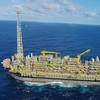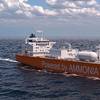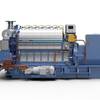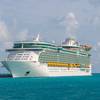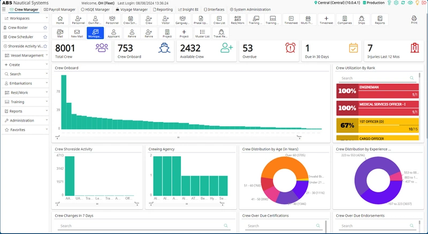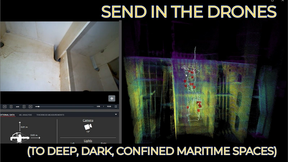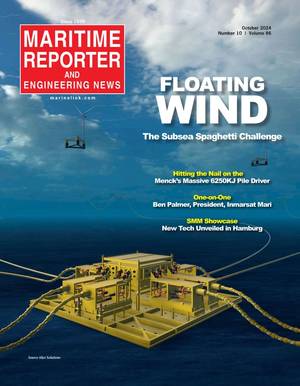Pride International Q2 2009 Results
Pride International, Inc. (NYSE: PDE) reported income from continuing operations for the three months ended June 30, 2009 of $121.8 million, or $0.69 per diluted share. The second quarter results compared to income from continuing operations of $153.1 million, or $0.87 per diluted share, for the corresponding three months in 2008. Results for the second quarter of 2008 included a net after-tax gain of $11.8 million, or $0.07 per diluted share, relating primarily to the sale of the company's platform rig fleet. Revenues during the second quarter of 2009 totaled $500.7 million compared to $541.5 million during the second quarter of 2008.
Louis A. Raspino, President and Chief Executive Officer of Pride International, Inc., stated, "Highlighting our second quarter financial results was the strong performance in our deepwater segment, where both utilization and average daily revenues improved compared to the first quarter. At 95% for the quarter, utilization was four points better that the previous quarter in 2009, when we had shipyard programs in progress. Six of our deepwater rigs achieved utilization of 98% or better in the second quarter, while one rig, the Pride Africa, experienced 22 days of out-of-service time to complete a standard survey. Also, higher dayrates for the semisubmersible rigs Pride South Pacific, which began a new contract in June at a dayrate of $650,000, and the Pride Brazil contributed to a modest increase in average daily revenues when compared to the prior quarter in 2009. Overall, our deepwater and midwater segments contributed 84% of total segment EBITDA in the quarter, reflecting our strong floating rig focus as we near the completion of our strategic transformation."
Net income for the three months ended June 30, 2009 was $124.1 million, or $0.70 per diluted share, including income from discontinued operations of $2.3 million, or $0.01 per diluted share. Net income for the three months ended June 30, 2008 was $187.4 million, or $1.06 per diluted share, including $34.3 million, or $0.19 per diluted share, of income from discontinued operations. Earnings before interest, taxes, depreciation and amortization (EBITDA) in the second quarter of 2009 was $197.1 million, compared to $249.8 million for the second quarter of 2008.
Looking forward, Raspino noted, "Out-of-service time in our floating fleet is expected to peak in the third quarter of 2009, as three rigs, the Pride North America, Pride Portland and Sea Explorer enter shipyards for maintenance and upgrades. In addition, we will be without the semisubmersible Pride Venezuela for the remainder of 2009 and into 2010 following the discovery of hull corrosion during an inspection in April 2009. The rig is currently preparing for mobilization to a shipyard for drydocking, where we will make a final assessment on repairs."
For the six months ended June 30, 2009, income from continuing operations was $278.3 million, or $1.58 per diluted share. The results include a net, after-tax gain of $3.2 million, or $0.02 per diluted share, relating to the sale of non-strategic assets. Net income over the same six month period totaled $283.0 million, or $1.61 per diluted share, and included $4.7 million, or $0.03 per diluted share, of income from discontinued operations. The results compared to income from continuing operations for the six months ended June 30, 2008 of $288.5 million, or $1.63 per diluted share, which included a net after-tax gain of $22.9 million, or $0.13 per diluted share, resulting from the sale of non-strategic assets. Net income during the six month period in 2008 was $427.3 million, or $2.40 per diluted share, including $138.8 million, or $0.77 per diluted share, of income from discontinued operations. Revenues for the six months ended June 30, 2009 were $1,050.0 million compared to $1,081.6 million for the corresponding six months in 2008.
In addressing the current business climate, Raspino noted, "Midwater and jackup rig segments remain weak around the world as available capacity builds, but the deepwater segment has demonstrated a stronger state, especially for those rigs with ultra-deepwater capabilities. The improvement in average crude oil prices, which were up 40% in the second quarter of 2009 compared to the first quarter, should provide support for exploration and production spending by our customers as we move into 2010. Current evidence implies an increasing focus by a number of our clients on new projects with start dates in the 2010 to 2012 period. The recent one year contract award for the Pride South Pacific for work offshore West Africa enables us to have the rig available once again in early 2011 when we expect increased customer spending in deepwater. The availability of this deepwater rig and several others in our fleet during the early part of the next decade, together with the addition of four ultra-deepwater drillships, provides significant opportunities for growth in earnings and shareholder value."
In closing, Raspino stated, "We remain focused on the separation of our mat-jackup rig business, which will complete the final step in our strategic transformation. While the significant deterioration in the worldwide economic environment and depressed drilling activity in the Gulf of Mexico region over the past 12 months have impeded our progress and made the road to separation more difficult, we expect to close the transaction in the very near future."
In June 2009, the company completed an offering of $500 million aggregate principal amount of 10 year senior notes bearing interest at 8.5% per year. Net proceeds from the offering totaled approximately $492 million and are expected to be used for general corporate purposes, which may include payments toward the company's four ultra-deepwater drillships currently under construction. At June 30, 2009, cash and cash equivalents were $1,116 million. Total debt was $1,207 million, resulting in a debt-to-total-capital ratio of 20%.
For the three months ended June 30, 2009, the company recorded cash flows from operations of $208 million, bringing cash flows for the first six months of 2009 to $375 million. Capital expenditures for the three and six months ended June 30, 2009 totaled $261 million and $475 million, respectively. The company expects to incur total capital expenditures in 2009 of approximately $1.1 billion, with an estimated $705 million relating to the construction of four ultra-deepwater drillships. An estimated $315 million was spent on the construction program during the first six months of 2009. At June 30, 2009, approximately $1.7 billion in capital expenditures remained to complete the four-rig program.
Revenues from the company's eight deepwater semisubmersibles and drillships improved 7% during the second quarter of 2009 to $234.8 million compared to $218.5 million in the first quarter of the year, with both utilization and average daily revenues higher. Earnings from operations increased 19% to $126.0 million during the second quarter of 2009 compared to $105.5 million during the first quarter of the year, while EBITDA was $145.1 million, 17% better than $124.3 million over the same comparative period. During the second quarter of 2009, the deepwater segment accounted for 63% of total segment EBITDA. Segment utilization improved to 95% during the second quarter of 2009, up from 91% during the first quarter of the year when the Pride Brazil completed a survey and upgrade and the Pride North America used nine days to complete maintenance and repairs. The second quarter improvement in utilization was partially offset by 22 days of out-of-service time on the drillship Pride Africa, which completed a survey. Average daily revenues for the segment increased to $338,500 in the second quarter of 2009 from $334,900 during the preceding quarter of the year, due in part to a dayrate increase in June on the semisubmersible rig Pride South Pacific to $650,000 from a previous dayrate of $428,300.
Although recent crude oil prices have improved close to 90% since declining below $35 per barrel in February 2009, many customers remain cautious in securing additional near-term rig time in deepwater exploration and production drilling. The higher average crude oil price experienced during the second quarter of 2009, if sustained, is expected to benefit deepwater activity over the next 12 to 24 months. Customer inquiries and formal tenders for deepwater rig requirements have trended higher during the second quarter of 2009, relative to levels seen during late 2008. The large majority of inquiries and tenders address deepwater exploration and field development projects with commencement dates in 2010 to 2012. These projects are globally diverse, including expected rig requirements in Mexico, Brazil, India, Angola and Australia, with average contract durations expected to range from two to five years. These incremental deepwater rig needs, along with the continued execution of projects in progress, are expected to keep the industry's deepwater fleet at or near full utilization for the immediate future, with dayrates for units capable of operating in greater than 7,000 feet of water displaying resilience to short-term oil price fluctuations. At June 30, 2009 the company had 91% of the available rig days in its deepwater segment under contract in the final two quarters of 2009, 89% in 2010 and 81% in 2011.
Revenues from the company's six midwater semisubmersibles were $113.7 million during the second quarter of 2009 compared to $131.8 million during the first quarter of the year. Over the same comparative period, earnings from operations and EBITDA declined to $37.5 million and $48.7 million, respectively, compared to $59.6 million and $71.1 million, respectively. Segment EBITDA accounted for 21% of total segment EBITDA in the quarter. The reduced segment financial results were driven predominately by lower utilization, which fell to 82% in the second quarter of 2009 from 92% during the preceding quarter of the year, reflecting the out-of-service time on the semisubmersible rig Pride Venezuela following the detection of hull corrosion in April and the mutually agreed termination of the rig's contract to allow for evaluation and repair. Over the past 60 days, temporary repairs have been completed on the hull. Preliminary estimates indicate permanent hull repairs and other planned maintenance could cost in the range of $50 million to $60 million, and up to 200 days to complete. The rig is expected to arrive at a shipyard during the third quarter where a final assessment on repairs will be completed. The Pride Venezuela is expected to be idle for the remainder of 2009. The contract termination led to a decline in average daily revenues in the second quarter of 2009 to $253,800 compared to $265,000 during the first quarter of 2009.
Near-term contract opportunities remain limited for midwater units around the world, resulting in a growing number of idle rigs, which totaled eight at June 30, 2009, up from four at December 31, 2008. The pervasive economic uncertainty, which has caused a number of customers to postpone drilling programs, is expected to result in an increased number of idle midwater units over the course of 2009, while the subleasing of rig time by customers remains active. The company's semisubmersible rig Pride South Seas is expected to complete a drilling program offshore South Africa in September. The increasing idle time and active subleasing market are expected to lead to a more challenging dayrate environment through 2009 and into 2010. The company has 68% of the available rig days contracted in the last two quarters of 2009, 67% in 2010 and 63% in 2011.
The company's independent-leg jackup segment, composed of seven units, reported revenues of $70.2 million during the second quarter of 2009 compared to $78.4 million during the preceding quarter of 2009. Earnings from operations were $30.6 million compared to $39.9 million over the same comparative period. Segment EBITDA was $37.6 million during the second quarter of 2009 compared to $46.9 million during the first quarter of the year. Lower utilization and average daily revenues contributed to the reduced financial performance. Utilization declined to 92% in the second quarter of 2009 from 98% in the preceding quarter of the year, due chiefly to out-of-service time on the Pride Tennessee for a planned survey, while average daily revenues declined to $119,400 from $126,500 over the same comparative period, following commencement of a 124-day contract extension on the Pride Wisconsin at a reduced dayrate of $105,000 compared to the previous dayrate of $129,000.
Idle capacity among independent leg jackup rigs operating internationally continues to build, with worldwide fleet utilization declining to approximately 82% at June 30, 2009, down from 93% at December 31, 2008. Dayrates for standard jackup rigs continue to decline as customers, especially in the Middle East, Asia and West Africa, reassess rig needs over the near- to intermediate-term. At the same time, jackup rig supply continues to build as new units complete construction, most without contracts. A total of 12 jackups were added to industry supply over the first six months of 2009, with another 17 units expected during the second half of the year. An estimated 11 units that have completed construction are presently idle in various yards in the Far East. Improving crude oil prices, if sustained, are expected to encourage incremental customer demand in 2010, but an imbalance between jackup rig supply and demand is expected to persist for the immediate future, resulting in lower average dayrates, relative to the dayrates achieved over the past 24 months. The company's jackup rig Pride Wisconsin is expected to conclude its current drilling assignment offshore Mexico in late-August.
Revenues from the company's mat-supported jackup rig segment, composed of 20 rigs, were $56.5 million during the second quarter of 2009 compared to $90.3 million during the previous quarter. Segment activity continued to decline during the second quarter with two out of 20 rigs idle and eight rigs cold stacked for the entire period and an additional two units idle for a substantial portion of the quarter, resulting in a utilization level of 35%. Utilization during the first quarter of 2009 was 50%. The decline in activity during the second quarter contributed to a loss from operations of $14.7 million compared to income from operations during the first quarter of 2009 of $6.8 million. EBITDA during the second quarter of 2009 was $0.2 million compared to $21.0 million during the previous quarter in 2009. Average daily revenues were $89,000 compared to $100,000 over the same comparative period.
Drilling activity in the U.S. Gulf of Mexico has fallen to historically low levels, with fewer than 20 jackup rigs under contract at mid-July 2009. Low natural gas prices, the inability of some customers to access the capital required to fund exploration and production programs in the region and the reallocation of client resources to more attractive drilling opportunities have contributed to the depressed activity. Absent a meaningful improvement in commodity prices and access to capital, the depressed activity level is expected to persist for the remainder of 2009 and possibly into 2010. Although 16 jackup rigs have been stacked in the U.S. Gulf of Mexico in 2009 and another four units have been permanently removed from service, jackup dayrates remain depressed.
Incremental jackup rig requirements in Mexico are expected as Petroleos Mexicanos (PEMEX) evaluates new field exploration and production projects. Many of these potential projects are expected to require jackup rigs with advanced capabilities, such as water depth ratings of 250 feet and greater. At June 30, 2009, the company had six mat-supported jackup rigs in Mexico, with four units under contracts that are expected to expire between August and October 2009. Two idle jackup rigs, the Pride Arkansas and Pride Nebraska, have recently been mobilized to the U.S. Gulf of Mexico where they have been cold stacked until activity improves. PEMEX is currently reviewing jackup needs to determine if there is additional work for the four mat-jackup rigs with contracts expiring in 2009.
Planned out-of-service time on the Pride North America, Pride Portland and Sea Explorer, in combination with lower expected activity on the Pride South Seas following the expected completion of a contract, and persistent weakness in the mat-jackup segment are expected to contribute significantly to an estimated $75 million to $80 million decline in third quarter 2009 revenues compared to revenues during the second quarter. The expected decline in revenues should be partially offset by an estimated $25 million to $30 million reduction in operating costs, resulting in expected third quarter 2009 earnings of approximately $0.38 to $0.43 per fully diluted share.



